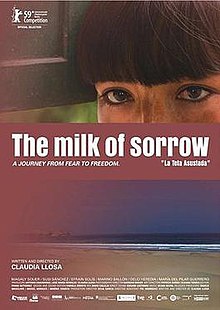La Teta Asustada
| The Milk of Sorrow | |
|---|---|
 |
|
| Directed by | Claudia Llosa |
| Produced by |
Antonio Chavarrías Claudia Llosa José María Morales |
| Written by | Claudia Llosa |
| Starring |
Magaly Solier Susy Sánchez Efrain Solís |
| Music by | Selma Mutal |
| Cinematography | Natasha Braier |
| Edited by | Frank Gutiérrez |
|
Release date
|
|
|
Running time
|
95 minutes |
| Country | Peru Spain |
| Language | Spanish Quechua |
The Milk of Sorrow (Spanish: La Teta Asustada, The frightened teat) is a 2009 film by Peruvian director Claudia Llosa and co-produced by Peru and Spain. The film stars Magaly Solier and addresses the fears of abused women during Peru's recent history. It won the 2009 Golden Bear award and FIPRESCI prize at the Berlin International Film Festival, as well as the award for best film in the 24 Festival Internacional de Cine de Guadalajara in Mexico. It was nominated for the 82nd Academy Awards for Best Foreign Language Film, becoming the first Peruvian film to be nominated for the award.
Fausta is suffering from a rare disease called the Milk of Sorrow, which is transmitted through the breast milk of pregnant women who were abused or raped (in times of terrorism, in Peru) during or soon after pregnancy. While living in constant fear and confusion due to this disease, she must face the sudden death of her mother. She chooses to take drastic measures to not follow in her mother's footsteps.
Between 1980 and 1992 Peru experienced a period of extreme violence, particularly in the Andean region, because of the uprising of the Maoist group Sendero Luminoso (Shining Path) and the actions of the paramilitary and state armed forces. By 1990 the conflict had reached Lima, the capital city of Peru. Claudia Llosa refers in her film to the folk belief that the trauma experienced by women who were raped by members of security force was passed on to their children through their breast milk. Thus, this period of violence continues to affect not only those who experienced it but also the next generation.
Llosa's work is a psychological as well as sociological approach to the 12 years of conflict, and is critical of the mass rapes used by the army as a strategy of war. The film is based on the book Entre Prójimos, by Kimberly Theidon. In her book, Theidon documents a number of testimonials by women who were raped by as many as thirty men at a time, atrocities that often resulted in pregnancies. Theidon states that "when survivors of sexual violence speak about their experiences, they place a responsibility on their listeners to respond to what they have heard." Llosa's film, too, is an attempt to respond to such testimonies.
...
Wikipedia
